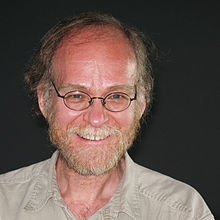Joseph Halpern
Joseph Y. Halpern (* 1953 ) is a Canadian computer scientist. He is a professor at Cornell University .
Halpern studied at the University of Toronto with a bachelor's degree in 1975, then spent two years in Ghana, where he taught mathematics at a school as part of the Canadian University Services Overseas (CUSO) and then continued his studies at Harvard University with the Master's degree in 1979 and doctorate with Albert Meyer (and Gerald Sacks ) in 1981 (Axiomatic definition of programming languages and logic of programs). As a post-doctoral student , he was at Harvard and the Massachusetts Institute of Technology (MIT) at the same time . From 1982 he did research at IBM , where he stayed until 1996 and from 1987 to 1989 manager of the mathematics group at the IBM Almaden Research Center. At the same time he held visiting professorships and advisory professorships (Consulting Professor) at Stanford University (and in 1990 in Toronto). From 1996 he was a professor at Cornell University, where he was co-director of the Cognitive Studies Program from 1996 to 2001 and headed the computer science faculty from 2010.
He was visiting professor at the Hebrew University in Jerusalem several times , in 2001/02 at the CWI in Amsterdam .
It deals with considerations on the concept of knowledge and uncertainty especially in distributed systems as well as in game theory and artificial intelligence. He also deals with modal logic , decision theory, distributed computing (and fault tolerance in distributed computing), program verification, causality, and semantics of programming languages.
In 1997 he received the Gödel Prize with Moses (for the formal definition of the term knowledge in distributed systems) and in 2009 both received the Dijkstra Prize . In 2015 he was elected to the American Academy of Arts and Sciences , in 2019 to the National Academy of Engineering . In 2008 he received the ACM-AAAI Allen Newell Award .
Fonts
- with Ronald Fagin , Yoram Moses , Moshe Vardi Reasoning about knowledge , MIT Press
Web links
Individual evidence
- ↑ A kind of Peace Corps for Canadians
- ↑ Meyer was at MIT, Sacks at Harvard
- ^ For Halpern, Moses Knowledge and Common Knowledge in a Distributed Environment , Journal of the ACM, Volume 37, 1990, p. 549
| personal data | |
|---|---|
| SURNAME | Halpern, Joseph |
| ALTERNATIVE NAMES | Halpern, Joseph Y. |
| BRIEF DESCRIPTION | Canadian computer scientist |
| DATE OF BIRTH | 1953 |
